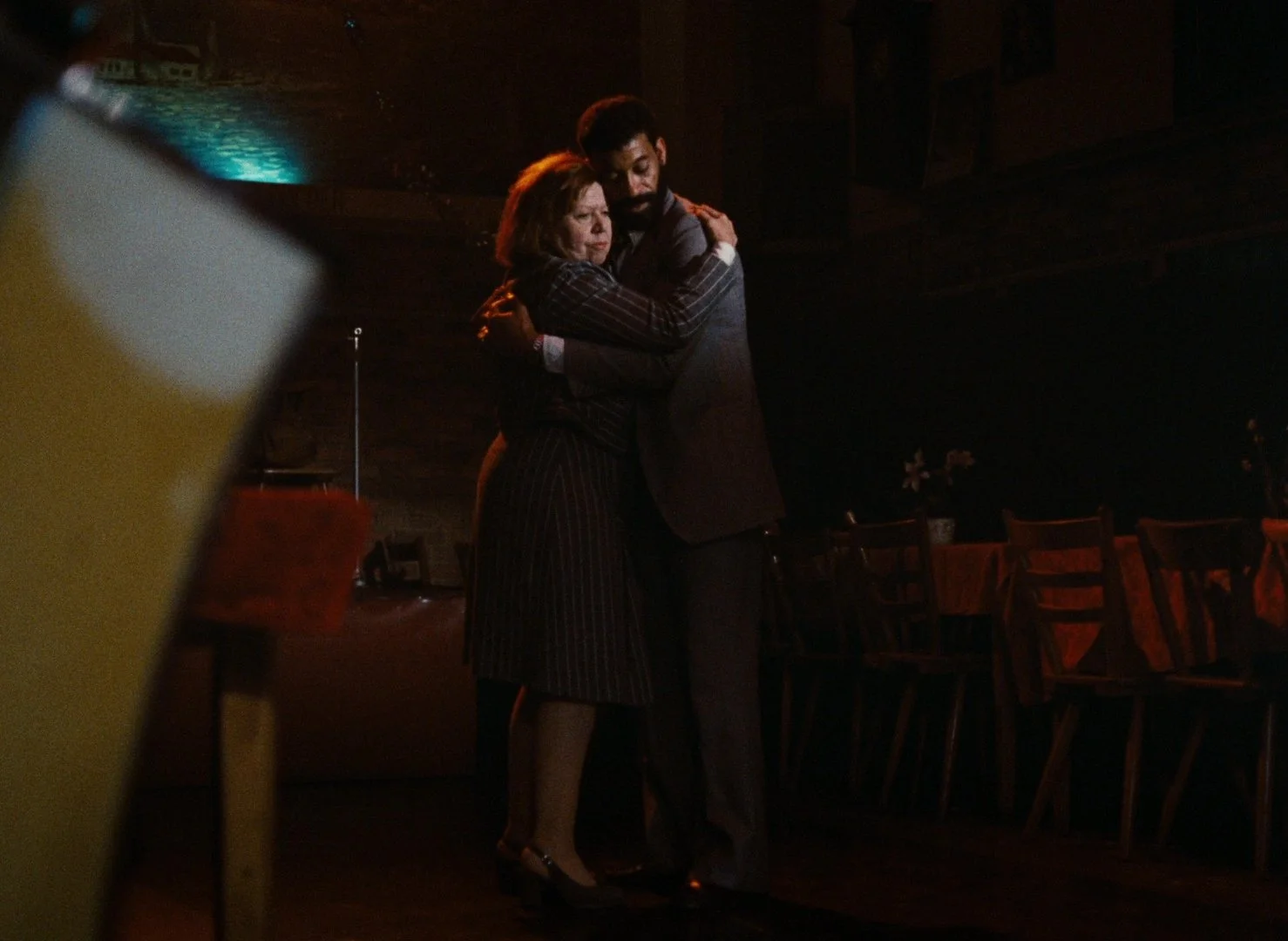Ali: Fear Eats the Soul (1974)
QFS No. 154 - Rainer Werner Fassbinder is one of those filmmakers whose work I, as film snob and student of film, should have seen. But instead, I pretend I know about Fassbinder – of course I do. I went to film school, you see.
QFS No. 154 - The invitation for October 9, 2024
Not to be mistaken with Ali (2001), the Michael Mann biopic about Muhammad Ali. Ali: Fear Eats the Soul, as far as I know, has very little boxing and probably even less Muhammad Ali in it. But who knows!
Rainer Werner Fassbinder is one of those filmmakers whose work I, as film snob and student of film, should have seen. But instead, I pretend I know about Fassbinder – of course I do. I went to film school, you see.
Consequently, I know very little about Ali: Fear Eats the Soul, but more than one person has recommended it to me in recent years. One institution gives this film high marks as well – specifically the British Film Institute, where it came in at No. 52 on the Greatest Films of All Time List. You’re familiar, of course, with the oft-cited/derided BFI/Sight & Sound list that comes out every decade. Well, Ali: Fear Eats the Soul is tied in 52nd I’ll have you know. Tied with (checks notes) News From Home (1976) directed by Chantal Akerman – you all know her as the director of the No. 1 Greatest Film of All Time, Jeanne Dielman, 23 Quai du Commerce, 1080 Bruxelles (1975, QFS No. 98).
Anyway, I’m looking forward to seeing my first Fassbinder film, which will be our third German film after Aguirre: The Wrath of God (1972, QFS No. 40) and Downfall (2004, QFS No. 28) – so it’s been about 112 films since our last time with the Germans. See Ali: Fear Eats the Soul and add Fassbinder to your snobby film cred as well!
Reactions and Analyses:
There’s a scene more than halfway through Ali: Fear Eats the Soul (1974) that feels like a fulcrum of film. Moroccan-born Ali (El Hedi ben Salem) and the older German widow Emmi (Brigitte Mira) have fallen in love, but their uncommon pairing has drawn the ire of nearly everyone they encounter. Emmi is shunned by neighbors and co-workers. Her grown children stormed out in anger, with one son Bruno (Peter Gauhe) even kicking in the screen of her TV set.
All of this Emmi accepts with grace, and feels that people, though surprised at their relationship, are eventually going to come around. She knows she’s old and people are prejudiced against people from the Arab world. But in this scene, her fortitude has run out. They’re in an outdoor café, in a plaza, surrounded by yellow chairs. Not one sits next to them, they’re in the center of their own world. All the café staff stand back and away from them, simply staring.
Emmi and Ali hold hands across the table and Emmi breaks down. She lashes out at them, at the world, for treating them this way when all they want is love. Ali tenderly strokes her hair to console her. The scene feels like a tipping point, the moment in which Emmi’s underlying belief in the ultimate goodness in people has cracked.
Ali: Fear Eats the Soul feels as if it could’ve taken place today, that it could be a contemporary story. It is a contemporary story – you can imagine these characters swapped with someone who is African American or Latinx or, well, Arab. Prejudice and racial discrimination is not unique to any one country.
What makes this film so unique, however, is that this is Germany not quite 30 years after the end of the Second World War. The references to Hitler are surprisingly casual and off-handed and suggests to me that director Rainer Werner Fassbinder is making a comment about his own country’s lingering difficulty with race and prejudice. Instead of blaming Jewish people for their ills, characters throughout blame the immigrants from Arab-speaking countries.
Emmi’s son-in-law Eugen (played by Fassbinder himself), a vile misogynist, bristles at the notion that his superior at work is Turkish. He sulks at home “sick” but clearly just lazy and drunk, demanding beers from his wife Krista (Irm Hermann), The two couple are miserable with each other, constantly insulting and clearly hate each other. Fassbinder seems to be deliberate about the juxtaposition of this scene with the previous one, which is after Ali has left Emmi’s place and the two have made love in the night. People may look down on Arabs for being “swine” and lazy, cramming in homes instead of buying their own place (according to the ladies Emmi works with), but Fassbinder forces us to see that this is untrue – just look at how miserable Eugen is and his home life with Krista. If anything, native-born Germans are the ones who are taking their good fortunate and privilege for granted.
But everything is deliberate with Fassbinder, we found. The compositions are steady still, often using doorways or the staircase to provide a frame within a frame or obstacles to our viewing. He moves the camera only when needed and with great effect to bring our attention to something in particular.
Take the opening scene. There’s beautiful, hypnotic Arabic music playing and a woman steps in from the rain into a place, drawn by the music. She’s a stranger here – the frame is still. The reverse angle, her perspective, we see everyone straight upright staring back at her. Their posture speaks volumes, as if to say something’s not right here. Then the bartender Barbara (Barbara Valentin), comes around the bar and the camera pushes in, she passes buy which creates extra dynamism in the camera move and it pushes closer to Ali, who we are introduced to here, in a way.
There are numerous instances when the camera’s movement is precise, purposeful, and helps tell the story in this way. Or lack of movement. Emmi and Ali go into an Italian restaurant (“Hitler used to go here!” is an unsettling plug for this place) after they’ve been married in court, and Fassbinder keeps his distance, playing much of the scene from another room through a doorway. It’s cold, like the reception they’re getting from the waiter as strangers in this place.
Although it had been well documented, I was previously unaware of Fassbinder’s connection with Douglas Sirk and about how he was inspired by the German ex-pat’s work in the American film industry. Sirk, who we just recently selected two films ago (Imitation of Life, 1959, QFS No. 152) mastered melodrama, but also mastered the ability to take on socially provocative subject matter. In Imitation of Life, it’s race, just as it is in Ali: Fear East the Soul. Several people over the years have pointed out that All that Heaven Allows (1955) is a direct parallel to Ali: Fear Eats the Soul – an older woman and a younger man fall in love – but Fassbinder supercharges it with race. But he does it in a way that’s even more evolved than Sirk, in my opinion.
Where Sirk does an admirable job tackling social touchpoints, specifically race in Imitation of Life in during a time where racial discrimination was high in America – Jim Crow laws still very much in effect throughout the South – Fassbinder inflects his story with another angle. Both characters are lonely. We can see the stress it inflicts on Ali as an Arab in that it actually starts to kill him. But he strives for any sort of comfort from home – couscous, for example. (Which led to this trenchant over-simplification by one in our group: “Can you make me couscous? No? I’m leaving.”)
It’s this loneliness that bring these two together. Is that enough to sustain a relationship? No, and it frays. But they come back together and there’s a sense that they truly do love each other, even though Ali is stoic and speaks in broken sentences.
If there’s a shortcoming of the film, is that Ali at times is objectified. This is possibly a comment as well by Fassbinder – he’s seen as one-dimensional if it fits someone’s needs. The woman feel his muscles, ask him for help, admire how young he is once people start to suddenly accept their relationship. Even the son comes and apologizes for breaking the television and sending a check. But even he is angling for something – he needs childcare from his mother to look after her grandkids when they need it.
So we don’t see Ali’s perspective enough, in my opinion. Had we been given a chance to see Ali speak in Arabic, for example, we wouldn’t see him as a brute as much, would see that he’s intelligent and thoughtful, perhaps, in ways that don’t come out as much when he’s struggling to speak in German. And see him comfortable in the other half of his dual identity as an Arab German.
One member in our QFS discussion group pointed out that we only see the racism and how people treat them after their married, and no other sense of their homelife. It becomes a bit too much, overly taxing, and gives us the feeling that the only thing they experience is racism. True, that’s the feeling conveyed, but if they love each other we could do with at least one or two scenes of domestic bliss. After all, we’re led to believe that they truly love each other and not that Ali is in this for some other gain or that she’s using him to stave off loneliness.
All this aside, Fassbinder’s stripped down film is somehow captivating. It’s this bare-bones feeling, this lack of cinematic tropes – which is far different than Sirk, by the way – that gives the impression of realism. Not Realism in formal sense, but a feeling that this is a very believable, realistic story that’s happening right now as we watch it unfold. And probably that’s because it is a story happening right now, every day, in many places around the world.
















